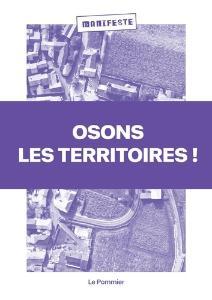Rethinking the sphere of education and training from a territorial perspective.
Appeal by the « Dare to be Territorial » collective
collectif Osons les territoires !, November 2022
The Manifesto « Let’s dare the territories » summarises the work carried out by the eponymous collective on the occasion of the 2022 elections. It defends the idea of a « compass of the second modernity », aiming to rebuild relationships in all fields and the eminent role that territories are called upon to play. In November 2022, a call was launched to « Rethink the sphere of education and training from the territories ». It invites us to take up the challenges of tomorrow in terms of education and to collectively imagine the basis for reforms…

Our societies will have to face immense and unprecedented challenges: the interdependence between societies at the global level, global warming, the ageing of the population, the renewal of the economic model, to name but a few. To meet these challenges we need to develop a collective capacity to understand and address them. Collective capacity » refers to the combination of individual skills on the one hand, and the ability to cooperate on the other.
The gap between the accumulation of knowledge and techniques and our capacity to face common challenges illustrates the crisis of the modalities of acquisition and transmission of knowledge, know-how and skills, what we could call the sphere of education and training, which includes the formal institutions of transmission of knowledge, from childhood and throughout life, and, more broadly, all the processes of acquisition of competences, all the processes of transmission of values and know-how that society implements.
Our crises, as the « Dare to be Territorial » Manifesto emphasises, are multifaceted crises of relationships, including, for each of us, the relationships between emotion and reason, reflection and action. To face them, we must be guided by the compass of the second modernity that inspires the creation or recreation of relationships in all fields.
Meeting the challenges involves inventing or acquiring the individual and collective skills, knowledge and attitudes needed to understand them, to assume our responsibilities in relation to them and to act together in response. This invention or acquisition takes place at different levels: from the need to rapidly train professionals capable of understanding and meeting the challenges to the training of future generations, from early childhood to old age.
A juxtaposition of reforms of different components of the education and training sphere is not enough. What we need is an integrated approach to its transformation.
The territory, a living or employment area, a space where most of society’s life takes place and an ecosystem of actors likely to cooperate with each other, is the preferred level for conceiving and transforming the entire sphere of education and training in an integrated manner, because it is a preferred space for rebuilding relationships, exercising the mutual responsibilities of the actors with regard to each other, combining knowledge, skills and attitudes, and taking account of society’s short- and long-term needs.
Each territory is crossed by global challenges that are all « glocal », i.e. both global and local. It is also a privileged space for systemic understanding of society, for learning and deploying cooperation, for combining thought and action. We can even say that an « intelligent city » is above all a city that makes its citizens intelligent because it offers them a thousand opportunities to develop a collective understanding of the issues at stake and to grasp them together, making the territory a permanent opportunity for formal and informal lifelong learning, as UNESCO is trying to promote with the Learning Cities Network.
On the basis of this observation, we believe that the transformation of the sphere of education and training should be approached not through a top-down approach whereby the State would define a set of reforms, leaving the territories to implement them, but, on the contrary, through a bottom-up approach, in application of the principle of active subsidiarity: Each territory builds its own understanding of the current sphere, defines what it should become in order to meet the requirements just described and outlines a transformation strategy, including by calling on the national and European levels when the blockages are located at this level. Then, based on the comparison of different territorial experiences, we will identify the principles that could be applied to all.
We call on territories, companies, institutions and professionals in education and training, networks of local authorities, universities and civil society, employers’ and employees’ unions to join the « Dare to be Territorial » collective in order to bring this ambition and concrete proposals for reform to the work of the National Council for Refoundation.